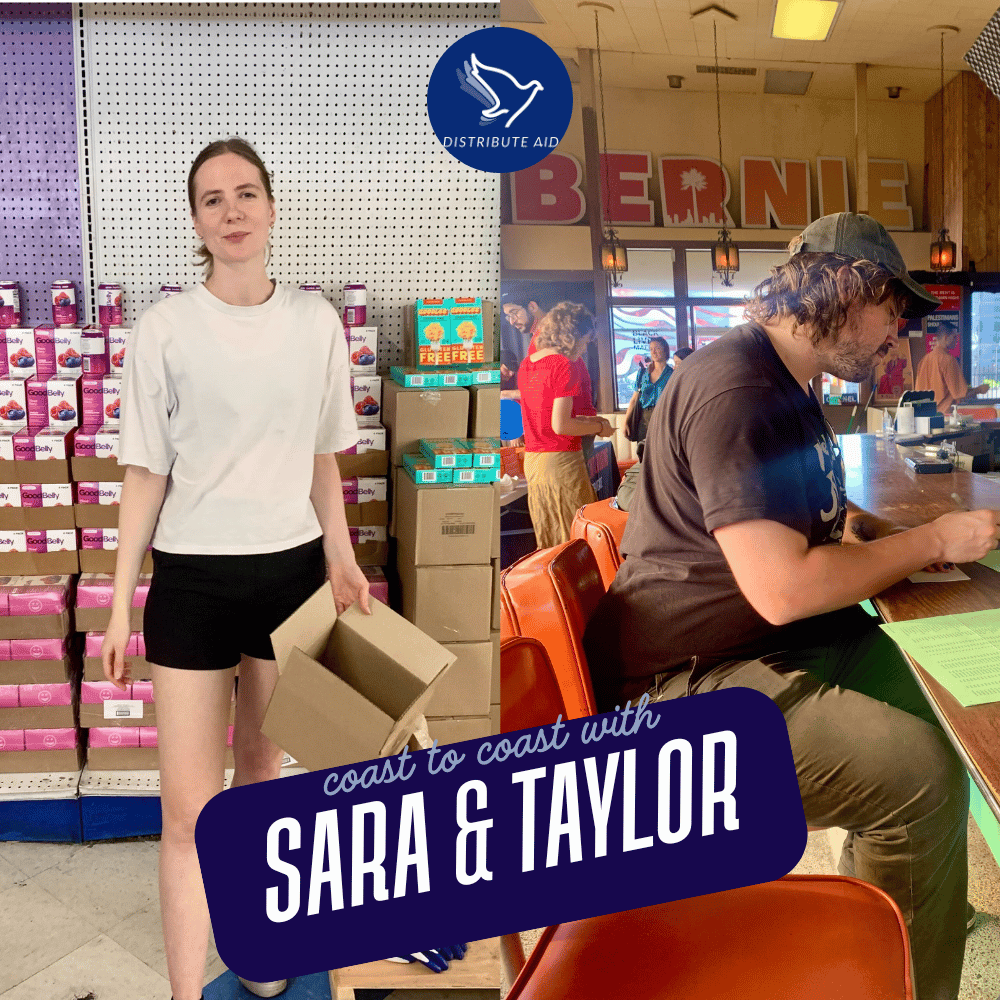- Distribute Aid
- Posts
- 5 interesting things we've noticed on our US trip
5 interesting things we've noticed on our US trip
From identity signifiers to giant burger to LA’s public transport

After two weeks in the United States, our 2025 tour is almost at an end.
Starting in Los Angeles, we (Sara and Taylor) have made our way east across the country. We’ve met with hundreds of friends, partners, and donors along the way. We’ve also encountered a surprising number of gun-toting guards in bulletproof vests outside supermarkets and book stores—one of whom, upon seeing our friend’s “Arm Trans Kids” shirt, suggested they join the local socialist rifle club.
Truly, America is a land of contrasts.
But in all seriousness: we’ve learned a lot, and what we’ve learned has given us much to think about. We’d be curious to know if any of these observations strike a chord with you, too. If they do, drop us a line at [email protected].
From Los Angeles mutual aid organizers to Silicon Valley techies to East Coast anarchists, the people who are doing something are hopeful. What they’re doing tends to vary widely: the LA crowd is focused on inequality and disaster preparation, for example, while in Silicon Valley everyone’s trying to figure out what to do with AI. They’re all worried about the future, but they believe they can play a role in shaping it.
The people who aren’t engaged in a communal effort of some kind tend to share this preoccupation about the future. But we saw a lot more despair among them, which makes sense. They’re correct to feel that things are bad right now!
If you’re in that group, we won’t try to convince you that you’re overreacting. Instead, we’d ask: would you like to feel something besides despair? And if so, would you be willing to invest a few hours in trying something new? Getting involved in a social organization gives you a direct, firsthand glimpse of how the world could be better. Maybe that would be a nice change!
(And if you don’t know where to get started, the Mutual Aid Hub has a great interactive map to find a mutual aid organization near you.)
Speaking of projects, there’s a lot happening around the country
Here are just a few of the things people are working on right now:
Organizing neighborhood get-togethers for disaster readiness
Delivering hot meals to people living on the street
Reducing the environmental impact of AI
The key takeaway here is: whatever you’re passionate about, other people around you are too. There’s a good chance they’ve already started a group to tackle that issue (seriously, check out that Mutual Aid Hub map!).
And if not, there’s an equally good chance people would be interested in joining such a group if you start it. You can find a helpful guide for starting a mutual aid group in the “Quick Hits” section below.
Politics (and identity) is at the top of most people’s minds
Everybody we met wanted to talk about politics. And in many cases, their expressions of political belief came hand-in-hand with declarations of their identity.
It was common for people to pepper their conversations with, “As someone who ______” or “As someone with ________,” even when that context wasn’t directly relevant. Sometimes it felt like they were trying to shield themselves before saying something they thought might be interpreted as controversial.
It was heartening to see how conscious people were about being inclusive and considerate of the challenges others are facing. At the same time, it was sometimes hard to follow the conversation and communicate clearly due to convoluted speech patterns and unfamiliar terminology. It feels too simplistic to say “this way of speaking to each other was good” or “it was bad,” but it was interesting to observe.
The jokes are true: everything’s bigger (and more disposable) in the US
From food to physical spaces, everything felt XXL. The most obvious example was at restaurants; if we went out for dinner, we’d come home with two meals’ worth of leftovers.
And in Los Angeles, we visited a free store for people displaced by wildfires where entire families could browse the aisles with a shopping cart—a far cry from Europe’s small community spaces, where people have to take tickets and enter in shifts due to space constraints.
Equally noticeable was the amount of waste. Takeaway coffee cups came with plastic lids (which were banned in Europe years ago). And it was often a struggle to find recycling or compost bins.
Los Angeles’ transit system is… not that bad?
When I (Sara) landed in LAX, my phone got a notification: did I want to download TAP (the LA transit app)? I hadn’t even known LA had a subway system, but two clicks later I was ready to ride.
When I told Angelenos that I was using public transport to get around the city, the reactions were either “why?” or “no, that’s too dangerous!” But to be honest, it was mostly fine! The prices were very cheap—less than $3 a day—and almost everywhere I wanted to go had a bus stop or subway station nearby. Considering all the horror stories I’d heard, I was pleasantly surprised.
Quick hits
Here are a few more things you might find interesting:
Want to start a mutual aid network? This guide provides a good 101-level explainer, along with a bunch of useful resources (from “how to make a phone tree” to legal and financial frameworks).
Médecins Sans Frontières (Doctors Without Borders) has released a report on the impacts felt in the first 100 days of US foreign aid cuts, which had previously accounted for 40% of global funding.
The US-Israeli Gaza Humanitarian Foundation is a lot of things, but “a genuine humanitarian foundation” is not one of them. This statement from CARE, a global movement dedicated to eradicating poverty, explains why.